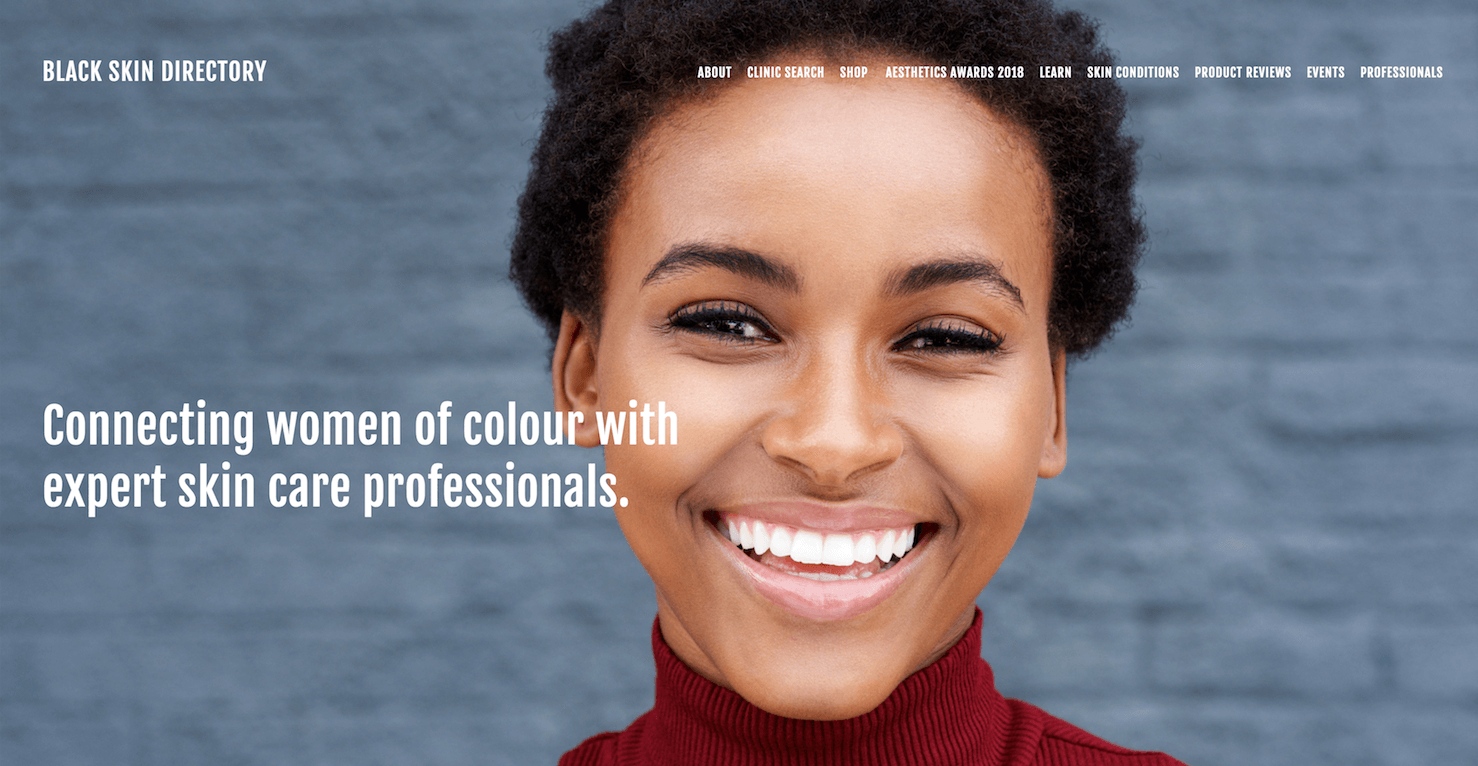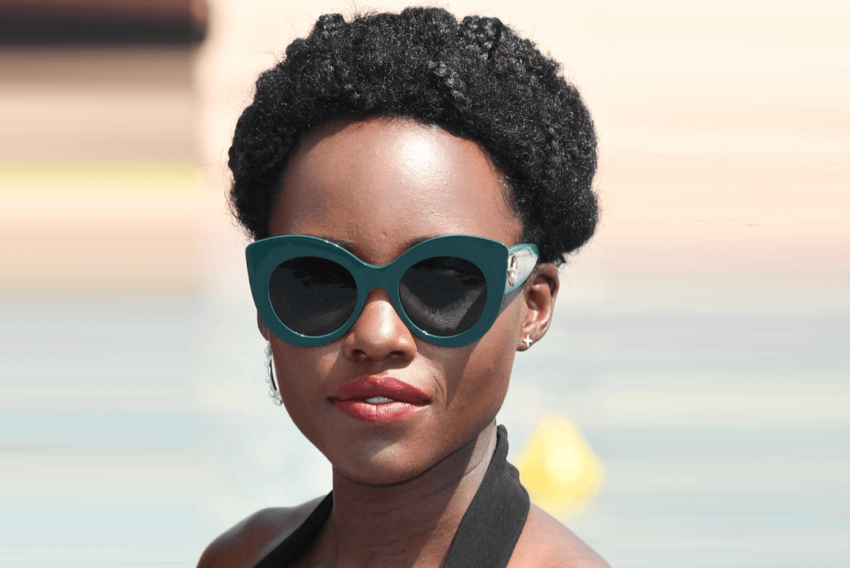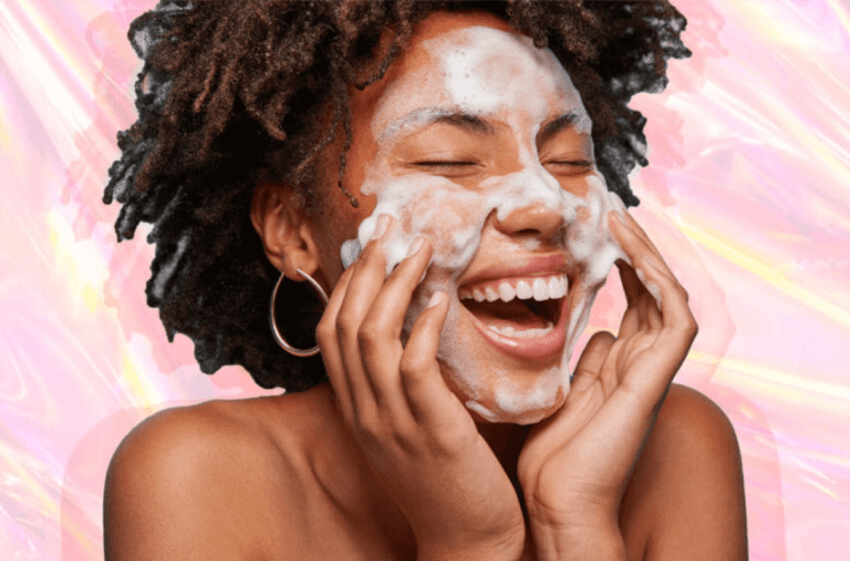The Black Skin Directory Debunks 5 Common Skincare Myths

Source: Black Skin Directory
There are literally hundreds of beauty myths out there! While some are no big deal, there are others that can be harmful to your health and skin if you believe them. Case in point, some of the myths surrounding skincare for Black skin. When we recently spoke with Dr. Charles, a leading dermatologist in skincare for darker skin tones and founder of Derma Di Calore, he explained to us that people of color need to treat certain skin conditions with more caution. Plus, as darker skin contains more melanin and higher levels of collagen, the best course of treatment varies.
Thankfully, sources like the Black Skin Directory, founded by Aesthetician Dija Ayodele, are revolutionizing the skincare industry by pointing women of color in the right direction, by locating dermatologists, aestheticians, and other skincare professionals who understand the “unique physiology of darker skin tones.”
The Black Skin Directory reported: “In a recent survey, 75 women of color were questioned about their experience in finding a skincare professional with darker skin. The results revealed that 92% of the respondents said it was a challenge to find and access a skincare professional that could meet their needs.”
Dija told us there are a ton of skincare myths that are widely believed, which are doing a lot of harm – like the belief sunscreen isn’t necessary. So, we enlisted Dija’s help to debunk five of the most common skincare myths surrounding darker skin tones.
Myth 1: Women of color don’t need anti-aging skincare
 Source: Samir Hussein/WireImage/Getty Images
Source: Samir Hussein/WireImage/Getty Images
Verdict: Not true
Dija explains: “The myth that Black people don’t show aging, e.g., fine lines and wrinkles, as early as Caucasian skin tones, has indeed some truth behind it,” as the darker your skin tone, the higher the level of melanin in your skin, which helps protect the skin from external damage, like sun damage and pollution. However, Dija states that darker skin tones still show signs of aging: “It’s in the form of mottling, hyperpigmentation, age spots, and lentigines.” The American Osteopathic College of Dermatology (AOCD) describes lentigines as, “Benign lesions that occur on the sun-exposed areas of the body. The lesions tend to increase in number with age, making them common among the middle age and older population.” They most commonly occur on the backs of hands and the face.
Skin Truth: A thorough skin routine still applies, but it may need to address different concerns. Dr. Carlos Charles suggests prescription-strength retinol and hydroquinone to help with age spots, as well as “vitamin C serums to assist in the treatment of hyperpigmentation.”
Posts You'll Love:
Myth 2: Hyperpigmentation is irreversible
Verdict: Not true (YAY!)
There’s a common misconception that hyperpigmentation on deeper skin tones is irreversible, but this is not the case. Dija says that “Hyperpigmentation on women of color is definitely something that can be treated through professional means. The quickest and safest in-clinic treatment to go for is monthly or even fortnightly chemical peels, to help lift the pigmentation – this works to turbocharge exfoliation and quickly get rid of excess pigmented cells.”
Dija says that you can also “Combine peels with laser treatments or LED light treatments. Although most practitioners would go for chemical peels and professional skincare products – this is more cost-effective for the patient.” Check out our post on the best hyperpigmentation treatments for darker skin tones here.
Skin Truth: Dr. Charles explains that the best way to prevent hyperpigmentation is to wear “daily protection from the sun’s UV rays as this will help prevent sun-related hyperpigmentation. Although, for hyperpigmentation caused by other factors such as various rashes and trauma, it will be treated as necessary.” Check out our fave sunscreens that work well under makeup here.
Myth 3: Sunscreen is optional
 Source: George Pimentel/WireImage/ Getty Images
Source: George Pimentel/WireImage/ Getty Images
Verdict: False!
Although women of color have more melanin in their skin, which helps to prevent sunburn, it does not protect against harmful rays from the sun, and skin cancer is still possible. This makes the ‘sunscreen is optional’ myth one of the most dangerous, and Dija confirms, “It’s another falsity. Anyone can get skin cancer. The presence of melanin in darker skin tones doesn’t provide an automatic guarantee of a cancer-free life. Although, studies show that they’re less likely to develop cancer like melanoma than a Caucasian. However, that melanoma proves more fatal due to lack of knowledge and awareness, monthly skin checks, and lack of sunscreen use.”
Dija told us about a recent study in The Medicine (Baltimore) Journal, “Which revealed that by the time many Black people go to the doctor, the melanoma (cancer) is more advanced. A person of color is 1.5 times more likely to die from it than a Caucasian, and on average there is a delay of 4.8 years before seeking medical attention.”
Skin Truth: For optimum protection, apply sunscreen every day with SPF 30 or 50 and a 5-star UVA rating to protect your skin from both UVA and UVB rays. You should also apply your sunscreen twenty minutes before you go into the sun, as it takes this long to activate. For more sunscreen myths and SPF tips, check out our SPF guide.
Myth 4: Laser hair removal is not an option
Verdict: Not entirely true
“A lot of women of color confuse laser with IPL or electrolysis. All are methods of hair removal, but IPL and electrolysis can leave scarring and post-inflammatory hyperpigmentation due to the short wavelengths,” Dija says. She also notes that while laser has its downsides, and not all lasers can be used on darker skin tones successfully, in the last 10 years it has become safer. She explained that “Nd: Yag laser bypasses the skin’s surface with longer wavelengths (consequently avoiding damage), penetrates deeper, and targets the hair follicle at its source.”
Skin Truth: There are many new lasers for darker skin tones. Dr. Doris Day, a dermatologist and laser expert, also recommends the Nd: Yag laser, explaining, “It has a longer wavelength and goes deeper but can be more painful and should be done by a dermatologist for safest results.”
Posts You'll Love:
Myth 5: Hydroquinone is an unsafe ingredient for people of color
Verdict: False
Hydroquinone is a lightening agent that’s often used to treat dark spots or hyperpigmentation, and there’s a common belief that it’s unsafe to use. Dija told us, “This is completely false! Hydroquinone has had a lot of bad press over the years, and it’s one of the medications we love to hate, even though it’s one of the few medically approved ingredients for skin lightening. Contrary to popular belief, Hydroquinone doesn’t break down existing pigment in the skin; it mainly stops new melanin from forming by preventing tyrosinase (a melanin catalyst).” Dr. Carlos also agrees although he explains that “High concentrations of hydroquinone should only be used for limited periods of time and under the guidance of a board-certified dermatologist, as they can cause skin darkening and irritant reactions.”
Skin Truth: If you’re experiencing dark spots or hyperpigmentation and you’re UK-based, use the Black Skin Directory to find a skin expert who can recommend the right course and prescription of hydroquinone for you. If you’re based in the US, seek out a specialist or board-certified dermatologist.
Check out the Black Skin Directory for lots more amazing information on common skin concerns, treatment methods, and product suggestions. Let us know if there are any other skincare myths you want help debunking in the comments below.























Leave a comment